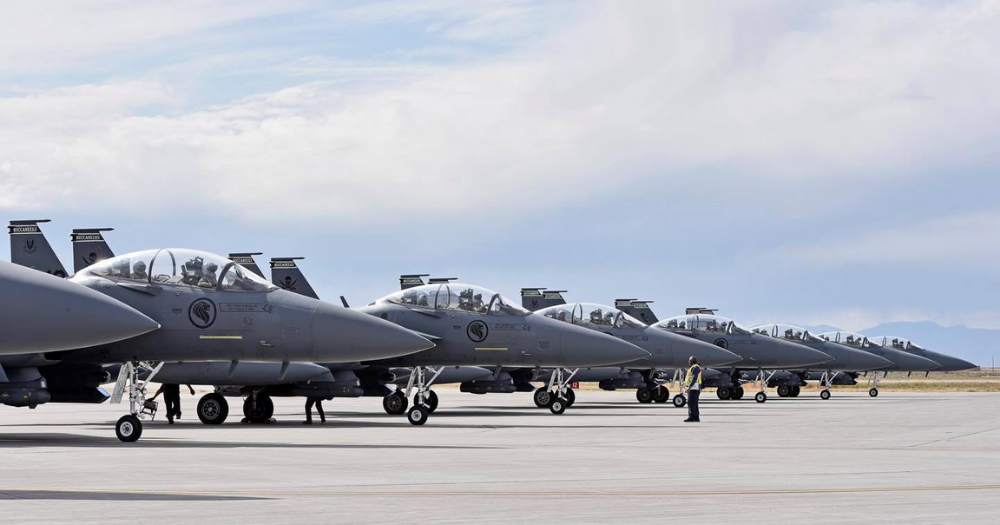For most of us in Singapore — especially those living near air bases — the roar of Republic of Singapore Air Force (RSAF) fighter jets can sometimes be disruptive.
Responding to parliamentary questions about RSAF's training schedule and readiness by Members of Parliament Jamus Lim and Sitoh Yih Pin, Minister for Defence Ng Eng Hen said in a written reply that the Ministry of Defence (MINDEF) and the Singapore Armed Forces (SAF) recognise the inconvenience and disruption to residents.
However, they have done "as much as [they] can" to keep the amount of local training to "essential" levels.
He also explained that RSAF pilots need to adequately train in order to "keep the RSAF sharp and able to protect us well".
RSAF has reduced its local training "as far as possible"
Sitoh had asked Ng whether the RSAF would consider reducing the number of early morning training sessions of military aircraft near residential areas, given the substantial increase of residents working from home due to Covid-19 measures.
Lim asked whether the operational readiness of the RSAF would be "significantly compromised" if sorties taking off from Paya Lebar Airbase were clustered into a small number of windows within the day, even if the duration of each window would be relatively longer.
In response, Ng stated that the RSAF has reduced its local training "as far as possible", and that around half of actual flying training occurs overseas.
"Singapore is thankful that we have our good friends and partners in many countries who support our defence efforts," he said.
He shared an anecdote about visiting Luke Air Force Base in Arizona in the U.S., where the RSAF's F16 pilots train.
After he thanked the surrounding town's mayor for their support and for tolerating the noise, Ng said that the mayor smiled and replied, "It’s the sound of freedom."
Other measures to reduce the noise
Locally, the RSAF has taken other measures to reduce the noise, said Ng.
For one, a "significant proportion" of local training is done through simulators.
And when it comes to actual flying, he added, most local flying is conducted over water rather than land, and avoids residential areas except during take-off, landing, and transit to and from training areas.
Ng gave an example:
"To illustrate, the northern end of the runway at Paya Lebar Air Base is approximately six kilometres from our territorial boundary.
The fighter pilots have mere seconds after take-off to bank a sharp left in order to keep within our territorial airspace."
Sorties taking off from Paya Lebar Air Base and Tengah Air Base are already clustered "where possible" in multiple groups, he said, even when smaller number of aircraft are involved.
In addition, the RSAF also adjusts its training tempo to accommodate sensitive periods.
For example, when national school examinations are held, the frequency of flights are reduced, and night flying activities end earlier.
And during the Covid-19 pandemic, when more people have been working and studying from home, the RSAF has "kept the level of local flying activities to the minimum needed to maintain operational readiness."
He added that flying is also spread across the week and on selected weekends.
Threat is real, not imagined
Maintaining a capable and operationally-ready RSAF is "critical for Singapore’s survival", Ng stated.
"Without this crucial deterrence, Singapore’s national defences can easily be compromised and with potentially catastrophic consequences."
"This regular training both locally and overseas keep the RSAF sharp and able to protect us well," he added. "It’s not against theoretical or imagined threats."
He gave several examples to demonstrate the importance of the RSAF, such as the historical example of Singapore's "existential vulnerability" during World War II, when Japanese fighter planes were able to bomb the island.
Nowadays, Ng said, the RSAF responds to more than 350 suspicious air threats in any given year, such as the bomb threat on a Singapore-bound Scoot flight in June 2019, which was intercepted and escorted by RSAF fighter jets back to Changi Airport.
"This state of high operational readiness of the RSAF is only possible with regular and realistic training," he said.
Totally unrelated but follow and listen to our podcast here
Top image via The Republic of Singapore Air Force / Facebook.
If you like what you read, follow us on Facebook, Instagram, Twitter and Telegram to get the latest updates.
